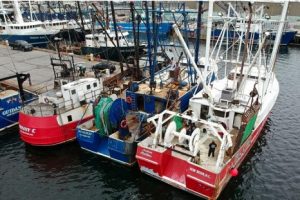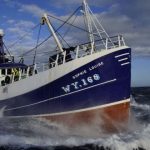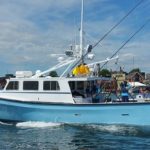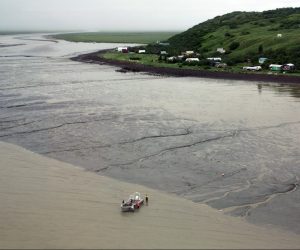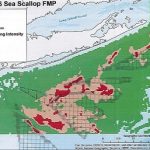Tag Archives: United Catcher Boats.
With little movement on salmon bycatch, Alaska advocates look to Biden administration for executive action
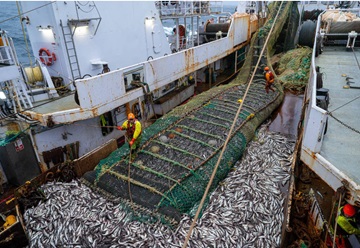 Amid catastrophic shortfalls in salmon harvests in some of Alaska’s rural, Indigenous communities, advocates have pleaded for a crackdown on unintentional catch of those same salmon by the trawl vessels that harvest billions of pounds of whitefish in the Bering Sea. But the politically appointed regional council that manages Bering Sea fisheries has largely resisted those requests. So instead, advocates are now taking another approach. They’re pushing the Biden administration for a workaround: a rewrite of the federal guidelines that tell the regional council, and its counterparts across the country, how to manage all the fisheries under their supervision. >>click to read<< 18:40
Amid catastrophic shortfalls in salmon harvests in some of Alaska’s rural, Indigenous communities, advocates have pleaded for a crackdown on unintentional catch of those same salmon by the trawl vessels that harvest billions of pounds of whitefish in the Bering Sea. But the politically appointed regional council that manages Bering Sea fisheries has largely resisted those requests. So instead, advocates are now taking another approach. They’re pushing the Biden administration for a workaround: a rewrite of the federal guidelines that tell the regional council, and its counterparts across the country, how to manage all the fisheries under their supervision. >>click to read<< 18:40
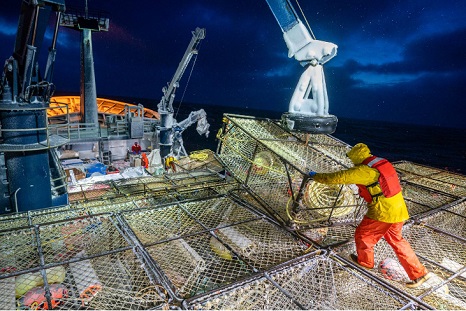
Bering Sea crab collapse spurs push for stronger conservation measures
For Bering Sea crabber Gretar Gudmundsson, December is a month for preparing his two boats for the winter harvest season. But not this year. For the first time, the winter snow crab season has been scuttled. The move has upended seasonal rhythms, and the financial stability of a crab fleet already slammed by a two-year shutdown of the fall harvest of red king crab. “We didn’t ship up any groceries. We didn’t recruit any crew. We’re not laying on fuel. Nothing is happening,” Gudmundsson said. Crabbers are pressing for more restrictions on pollock fleets, which deploy large cone-shaped trawl nets to scoop up more than 3.2 billion pounds annually of this fish in the biggest single-species harvest in North America. >click to read< 11:55
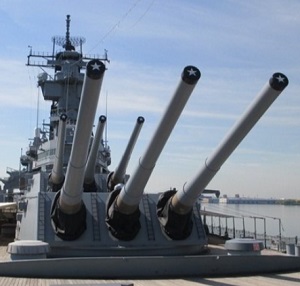
Seafood industry seeks protection from Russian military exercises in U.S. waters
U.S. Coast Guard capability to safeguard national interests and promote economic security in the Arctic will be the subject of a congressional hearing on Dec. 8, one in which Alaska’s commercial fishing entities have a special concern. “From our vantage point, on the front lines of a changing Arctic, a robust U.S. military presence to protect U.S. interests in the region is simply non-negotiable,” said Stephanie Madsen, executive director of At-Sea Processors. The trade association, based in Seattle, represents six member companies who own and operate 15 U.S. flag catcher/processor vessels who harvest Alaska Pollock in the Bering Sea and Aleutian Islands and Pacific whiting in Pacific Northwest coastal waters. >click to read< 08:26
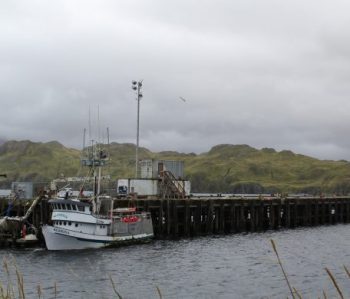
Amid a big fight for cod in the Bering Sea, can remote Adak survive?
A heap of slimy fish heads nearly filled a deep tote. Above, workers finished sorting stacks of decapitated halibut they had run through a grim mechanical apparatus. “Right here we have a guillotine blade,” said Mike Lauer, showing off the de-heading device. “We’ll sell the cheeks, and then we can use the heads for bait,” he added. Lauer is in charge of quality control for Golden Harvest, a processing plant on Adak that’s at the center of a fish war in the Bering Sea pitting two small Aleutian Island communities against large out of state fishing interests. And the implications of that fight could stretch to other coastal fishing towns in Alaska. >click to read< 21:08
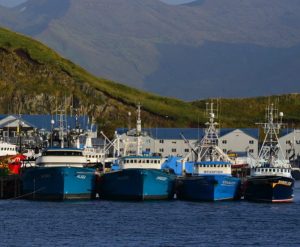
Government shutdown, if it continues, could cost Alaska’s lucrative Bering Sea fisheries
Even if the shutdown does persist, the federal government will allow the Bering Sea fisheries to start as scheduled, with an initial opening for cod Jan. 1, and a second opening for pollock and other species Jan. 20. But the fisheries are heavily regulated, and before boats can start fishing, the federal government requires inspections of things like scales — for weighing fish — and monitoring equipment that tracks the number and types of fish being caught. And the National Marine Fisheries Service, which regulates the Bering Sea fisheries, isn’t doing those inspections during the shutdown. >click to read<20:16
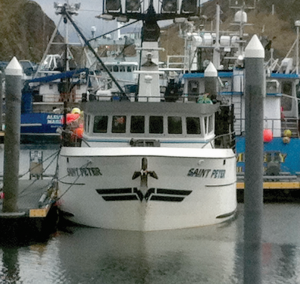
Bering Sea Battle breaks out over growth of ‘Super 8s’ in state cod fishery
The success of the state waters Dutch Harbor Pacific cod fishery in the Bering Sea is scaring both the industrial trawl and longline fleets, and even a local Unalaska fisherman who says a new breed of small boats known as Super 8s are catching way too many fish. In 2014, the new fishery opened with 3 percent of the total Bering Sea cod quota, and two years later it more than doubled to 6.4 percent, by votes of the Alaska Board of Fisheries to promote small boat fisheries. And it may get a lot bigger, as the board will soon hear proposals for growing the fishery to 8, 10 or as much as 20 percent of all the cod available to fishermen in the Bering Sea. >click to read<11:28
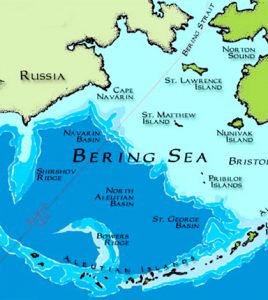
Bering Sea Cod caught quickly – “I wouldn’t be surprised if it’s the shortest ever,”
The Bering Sea federal trawl cod fishery closed in what may be record time on Feb. 11, just 22 days after the Jan. 20 opener, according to National Marine Fisheries Service Biologist Krista Milani in Unalaska/Dutch Harbor.,,, The North Pacific Fishery Management Program is now considering a plan to restrict the number of boats eligible to fish for cod in the Bering Sea. The fish council floated ideas to limit catcher vessel participation in the Bering Sea cod fishery, including controversial catch shares or individual fishing quotas, during a December meeting in Anchorage. >click to read< 15:00 
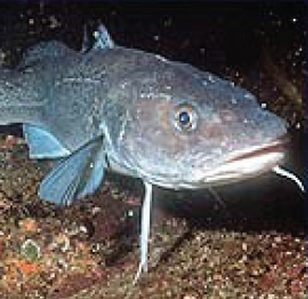
Bering Sea cod conflict brewing between on and offshore buyers
“Cod Alley” is getting crowded, and some fishermen want to limit the boats in the narrow congested fishing area in the Bering Sea. The North Pacific Fishery Management Council is looking at changes, including restricting flatfish factory trawlers from buying cod offshore. The Pacific Seafood Processors Association is pushing for restrictions on factory trawlers to protect its members’ shore plants in Unalaska, Akutan, King Cove and Sand Point. According to the PSPA’s Nicole Kimball, seven factory trawlers bought cod from 17 catcher boats in 2017,,, click here to read the story 21:23
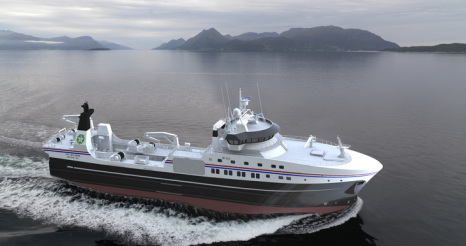
Pacific Seafood Processor’s Association seeks probe into America’s Finest foreign steel
The trade group representing Alaska’s onshore fish processing plants is challenging a request for an exemption to a federal law limiting the amount of foreign steel allowed in fishing vessel construction. The Pacific Seafood Processor’s Association has major issues with the request for a Jones Act waiver sought by Fisherman’s Finest, the owner of the embattled flatfish factory trawler American’s Finest, and its builder, the Washington shipyard Dakota Creek Industries. The 261-foot vessel is nearly complete at a cost of at least $60 million, and cannot fish in U.S. waters without the waivers. PSPA’s members include Unisea and Westward in Unalaska, and most of the other fish processors in Alaska. click here to read the story 09:52
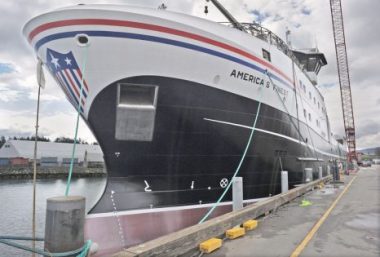
Dakota Creek Industries trying to make things right in eyes of Congress
Dakota Creek Industries owner Mike Nelson and his staff have been looking for ways to appease federal lawmakers following the mistake the company made in building the $75 million fishing vessel America’s Finest. The mistake — using too much foreign-formed steel in the vessel’s hull — requires a waiver from the U.S. Congress in order for the ship to fish domestically. The waiver would be for the Jones Act, which requires domestic fishing vessels be built in the U.S. These days, Nelson glances frequently at his cell phone hoping for good news concerning his company’s lobbying efforts in Washington, D.C. click here to read the story 12:12
Fishing-industry groups blast Inslee over his picks for federal council
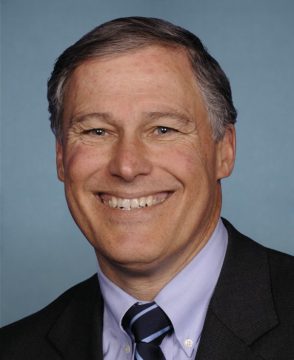 Gov. Jay Inslee’s handling of nominations for a federal fishery-council seat has come under attack from the leaders of major North Pacific fishing-industry groups, which have taken the unusual step of sending a complaint letter to the U.S. Secretary of Commerce.,, In their letter sent Tuesday, they asked Commerce Secretary Wilbur Ross to reject Inslee’s nominations and called for the governor to come up with some new names for a seat on the council. The industry backlash reflects the high stakes in fish politics, where the federal fishery council helps sets the rules for a billion-dollar groundfish harvest, much of which is caught and processed by Seattle-based companies. The letter is signed by the leaders of the Pacific Seafood Processors Association, At-Sea Processors Association, Groundfish Forum, and United Catcher Boats, whose membership collectively catches or processes most the groundfish. Read the article, click here 10:05
Gov. Jay Inslee’s handling of nominations for a federal fishery-council seat has come under attack from the leaders of major North Pacific fishing-industry groups, which have taken the unusual step of sending a complaint letter to the U.S. Secretary of Commerce.,, In their letter sent Tuesday, they asked Commerce Secretary Wilbur Ross to reject Inslee’s nominations and called for the governor to come up with some new names for a seat on the council. The industry backlash reflects the high stakes in fish politics, where the federal fishery council helps sets the rules for a billion-dollar groundfish harvest, much of which is caught and processed by Seattle-based companies. The letter is signed by the leaders of the Pacific Seafood Processors Association, At-Sea Processors Association, Groundfish Forum, and United Catcher Boats, whose membership collectively catches or processes most the groundfish. Read the article, click here 10:05
Trawlers banned from Unalaska Bay
 Unalaska Bay was completely shut down to trawlers by state regulators last week after a long campaign by the Unalaska Native Fisheries Association representing local small boats. The Alaska Board of Fisheries approved UNFA’s request last week while meeting in Anchorage, closing all waters of Unalaska Bay year-round to groundfish fishing with pelagic trawl gear, according to UNFA member and Unalaska resident Walter Tellman. The fish board voted 6-1 to close the bay to trawlers, he said. Opposed, Tellman said, were officials of and trawler captains. Brent Paine, the executive director of United Catcher Boats, declined to comment this week on the latest closure. Jim Paulin photo Read the article here 16:14
Unalaska Bay was completely shut down to trawlers by state regulators last week after a long campaign by the Unalaska Native Fisheries Association representing local small boats. The Alaska Board of Fisheries approved UNFA’s request last week while meeting in Anchorage, closing all waters of Unalaska Bay year-round to groundfish fishing with pelagic trawl gear, according to UNFA member and Unalaska resident Walter Tellman. The fish board voted 6-1 to close the bay to trawlers, he said. Opposed, Tellman said, were officials of and trawler captains. Brent Paine, the executive director of United Catcher Boats, declined to comment this week on the latest closure. Jim Paulin photo Read the article here 16:14
Alaska groups seek cut in salmon bycatch caught by pollock industry
 Tribal organizations and fishing groups in Alaska are urging federal fishery managers to drastically reduce the number of king salmon allowed to be inadvertently caught by commercial pollock trawlers each year. Industry representatives, however, say the harvest of king salmon bycatch has never come close to reaching those limits. They also say some of the salmon caught is frozen and distributed through food banks. “The pollock fishery and the boat owners and the captains are all very, very well aware of the crisis that is occurring in these communities,, Read the rest here 11:18
Tribal organizations and fishing groups in Alaska are urging federal fishery managers to drastically reduce the number of king salmon allowed to be inadvertently caught by commercial pollock trawlers each year. Industry representatives, however, say the harvest of king salmon bycatch has never come close to reaching those limits. They also say some of the salmon caught is frozen and distributed through food banks. “The pollock fishery and the boat owners and the captains are all very, very well aware of the crisis that is occurring in these communities,, Read the rest here 11:18
Trawlers defeat relief for halibut fishermen – Balk at Compensation
 The emergency measure was opposed by the At-sea Processors Association, United Catcher Boats, and other industry groups. The failed emergency measure was part of the voting to set quotas for Bering Sea groundfish species, including the billion dollar pollock fishery. Trawlers feared that a reduction in halibut bycatch limits for trawlers could shut them down early, leaving their fish in the water. But halibut fishermen complain that the trawlers are allowed to waste more than they’ll be allowed to catch for the high-value market, a policy called “unacceptable” by St. Paul mayor Simeon Swetzof. Read the rest here 21:08
The emergency measure was opposed by the At-sea Processors Association, United Catcher Boats, and other industry groups. The failed emergency measure was part of the voting to set quotas for Bering Sea groundfish species, including the billion dollar pollock fishery. Trawlers feared that a reduction in halibut bycatch limits for trawlers could shut them down early, leaving their fish in the water. But halibut fishermen complain that the trawlers are allowed to waste more than they’ll be allowed to catch for the high-value market, a policy called “unacceptable” by St. Paul mayor Simeon Swetzof. Read the rest here 21:08
Pollock Fleet Sees Spike in Squid Bycatch
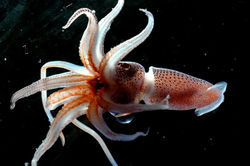 While salmon is still the main species that pollock fishermen are trying to avoid taking as bycatch this summer, there’s another creature that’s been causing problems in the Bering Sea. Along with their pollock, fishermen have pulled up about 1,100 metric tons of slimy, pink squid this summer. That’s more than four times their catch limit,,,Read more here 11:48
While salmon is still the main species that pollock fishermen are trying to avoid taking as bycatch this summer, there’s another creature that’s been causing problems in the Bering Sea. Along with their pollock, fishermen have pulled up about 1,100 metric tons of slimy, pink squid this summer. That’s more than four times their catch limit,,,Read more here 11:48

































